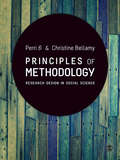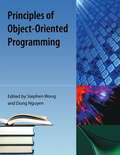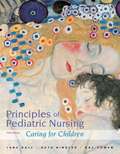- Table View
- List View
Principles of Marketing 2.0
by Jeff Tanner Mary Anne RaymondPrinciples of Marketing Version 2.0 by Tanner, Raymond and Schuster teaches the experience and process of actually doing marketing - not just the vocabulary. It carries five dominant themes throughout in order to expose students to marketing in today's environment: Service dominant logic - This textbook employs the term "offering" instead of the more traditional First "P" -- product. That is because consumers don't sacrifice value when alternating between a product and a service. They are evaluating the entire experience, whether they interact with a product, a service, or a combination. So the fundamental focus is providing value throughout the value chain, whether that value chain encompasses a product, service, or both. Sustainability; Increasingly, companies are interested in the impact they are having on their local community as well as the overall environment. This is often referred to as the triple bottom line of financial, social, and environment performance. Ethics and social responsibility; Following on the sustainability notion is the broader importance of ethics and social responsibility in creating successful organizations. The authors make consistent references to ethical situations throughout chapter coverage, and end of chapter material in most chapters will encompass ethical situations. Global coverage -- Tanner, Raymond and Schuster deliberately entitled Chapter 1; What is Marketing?; Whether it is today's price of gasoline, the current U.S. presidential race, or Midwestern U.S. farming, almost every industry and company needs strong global awareness. And today's marketing professionals must understand the world in which they and their companies operate. Metrics -- Firms today have the potential to gather more information than ever before about their current and potential customers. That information gathering can be costly, but it can also be very revealing. With the potential to capture so much more detail about micro transactions, firms should now be more able to answer ;well, what this marketing strategy really worth it?; And what is the marketing ROI?; And finally, what is this customer or set of customers worth to us over their lifetime? Principles of Marketing Version 2.0 brings new and updated coverage of new developments in the influence of social media to empower consumers, as well as marketing's use of social media, such as sentiment analysis, mobile marketing, and customer service and complaint tracking, as a communications and promotion channel, just a name a few. Version 2.0 also has an overall increased number of examples, as well as, new discussion questions in every chapter (resulting in at least 10 per chapter). In addition, the textbook's key terms, and repeated concepts have been strategically arranged to make customizing this book with Flat World's MIYO platform even easier.
Principles of Marketing 2.0
by Jeff Tanner Mary Anne RaymondPrinciples of Marketing Version 2.0 by Tanner, Raymond and Schuster teaches the experience and process of actually doing marketing - not just the vocabulary. It carries five dominant themes throughout in order to expose students to marketing in today's environment: Service dominant logic - This textbook employs the term "offering" instead of the more traditional First "P" -- product. That is because consumers don't sacrifice value when alternating between a product and a service. They are evaluating the entire experience, whether they interact with a product, a service, or a combination. So the fundamental focus is providing value throughout the value chain, whether that value chain encompasses a product, service, or both. Sustainability; Increasingly, companies are interested in the impact they are having on their local community as well as the overall environment. This is often referred to as the triple bottom line of financial, social, and environment performance. Ethics and social responsibility; Following on the sustainability notion is the broader importance of ethics and social responsibility in creating successful organizations. The authors make consistent references to ethical situations throughout chapter coverage, and end of chapter material in most chapters will encompass ethical situations. Global coverage -- Tanner, Raymond and Schuster deliberately entitled Chapter 1; What is Marketing?; Whether it is today's price of gasoline, the current U.S. presidential race, or Midwestern U.S. farming, almost every industry and company needs strong global awareness. And today's marketing professionals must understand the world in which they and their companies operate. Metrics -- Firms today have the potential to gather more information than ever before about their current and potential customers. That information gathering can be costly, but it can also be very revealing. With the potential to capture so much more detail about micro transactions, firms should now be more able to answer ;well, what this marketing strategy really worth it?; And what is the marketing ROI?; And finally, what is this customer or set of customers worth to us over their lifetime? Principles of Marketing Version 2.0 brings new and updated coverage of new developments in the influence of social media to empower consumers, as well as marketing's use of social media, such as sentiment analysis, mobile marketing, and customer service and complaint tracking, as a communications and promotion channel, just a name a few. Version 2.0 also has an overall increased number of examples, as well as, new discussion questions in every chapter (resulting in at least 10 per chapter). In addition, the textbook's key terms, and repeated concepts have been strategically arranged to make customizing this book with Flat World's MIYO platform even easier.
Principles of Marketing Version 4.0
by Jeff Tanner Mary Anne RaymondPrinciples of Marketing is an up-to-date overview of how marketing is actually done in today's world. It is a valuable resource for a first course in marketing at any level, clearly explaining effective marketing strategies and proven techniques.
Principles of Marketing version 2.0
by Jeff Tanner Mary Anne RaymondPrinciples of Marketing Version 2.0 by Tanner and Raymond teaches the experience and process of actually doing marketing - not just the vocabulary. It carries five dominant themes throughout in order to expose students to marketing in today's environment:
Principles of Methodology: Research Design in Social Science
by Perri 6 Christine BellamyThis book provides a comprehensive, accessible guide to social science methodology. In so doing, it establishes methodology as distinct from both methods and philosophy. Most existing textbooks deal with methods, or sound ways of collecting and analysing data to generate findings. In contrast, this innovative book shows how an understanding of methodology allows us to design research so that findings can be used to answer interesting research questions and to build and test theories. Most important things in social research (e.g., beliefs, institutions, interests, practices and social classes) cannot be observed directly. This book explains how empirical research can nevertheless be designed to make sound inferences about their nature, effects and significance. The authors examine what counts as good description, explanation and interpretation, and how they can be achieved by striking intelligent trade-offs between competing design virtues. Coverage includes: * why methodology matters; * what philosophical arguments show us about inference; * competing virtues of good research design; * purposes of theory, models and frameworks; * forming researchable concepts and typologies; * explaining and interpreting: inferring causation, meaning and significance; and * combining explanation and interpretation. The book is essential reading for new researchers faced with the practical challenge of designing research. Extensive examples and exercises are provided, based on the authors' long experience of teaching methodology to multi-disciplinary groups. Perri 6 is Professor of Social Policy in the Graduate School in the College of Business, Law and Social Sciences at Nottingham Trent University. Chris Bellamy is Emeritus Professor of Public Administration in the Graduate School, Nottingham Trent University.
Principles of Microeconomics
by Libby Rittenberg Timothy TregarthenToday we are excited to introduce Libby Rittenberg and Timothy Tregarthen's Principles of Microeconomics. The authors teach economics as the study of "choice " by providing students with an accessible, straightforward overview of economics. This text combines the clarity and writing of Tregarthen's seminal periodical "The Margin" with great teaching insights. Rittenberg and Tregarthen help students to understand how real individuals actually work with economics. In this new book, the authors illustrate the practicality and relevance of economics with a variety of new illustrations and insights. The authors take a three-pronged approach to every concept: (1) the concept is covered with a "Heads Up" to ward off confusion, (2) a "You Try It" section makes sure students are staying on top of the concept and (3) a "Case and Point" section that uses a real-world application to harness the concept in reality.
Principles of Microeconomics
by Libby Rittenberg Timothy TregarthenIn Principles of Microeconomics, the authors explore how political outcomes of events, such as Brexit and the election of Donald Trump, affect economic policies and economic outcomes. Throughout the last decade, economists have received the public’s attention, and the authors saw an opportunity to share economic principles and thinking in a way that emphasizes their relevance in today’s world.
Principles of Microeconomics
by N. Gregory MankiwProvide an inviting, superbly written introduction to microeconomics that allows all types of students to quickly grasp microeconomic concepts and build a strong foundation. The most widely-used learning solution in economics classrooms worldwide, written by acclaimed author and economist Gregory Mankiw, PRINCIPLES OF MICROECONOMICS, 9E focuses on the most important microeconomic principles to avoid overwhelming students with excessive detail. Extensive updates, relevant contemporary examples and carefully crafted content present the understanding your students need at key moments in your course. This edition works seamlessly with the latest MindTap digital course solutions and powerful student-focused resources, featuring the highly acclaimed Graph Builder and enhanced Adaptive Test Prep. A team of award-winning teaching economists have further strengthened this edition's leading ancillary support with more relevance, engagement, and interactive learning opportunities.
Principles of Microeconomics
by N. Gregory MankiwIntroduce microeconomics using the inviting, reader-friendly approach in PRINCIPLES OF MICROECONOMICS, 10E by acclaimed author and economist Gregory Mankiw. The most widely-used learning solution in economics classrooms worldwide, this edition is designed to guide all types of learners to a strong foundation in microeconomics with the latest updates, interactive practice and current examples. Carefully crafted content focuses on the most important microeconomic principles to avoid overwhelming students with excessive detail. The author presents the background students need at key moments in your course. This edition works seamlessly with the latest MindTap digital course solutions and student-focused resources. A leading support package by award-winning teaching economists with Aplia homework solutions and author videos provides additional relevance and interactive learning opportunities.
Principles of Microeconomics
by OpenStaxPrinciples of Microeconomics covers the scope and sequence for a one-semester economics course. The text also includes many current examples, including; the Keystone Pipeline, Occupy Wall Street, and debates over the minimum wage. The pedagogical choices, chapter arrangements, and learning objective fulfillment were developed and vetted with feedback from educators dedicated to the project. The outcome is a balanced approach to economics and to the theory and application of economics concepts. Current events are treated in a politically-balanced way, as well.
Principles of Microeconomics (2nd Edition)
by N. Gregory MankiwIn this textbook, Mankiw's conversational writing style helps in presenting the politics and science of economic theories to tomorrow's decision-makers. The book is intriguing students to apply an economic way of thinking in their daily lives.
Principles of Microeconomics (2nd Edition)
by Timothy TaylorA textbook that is rooted to help students perform well in introductory economics and acquire the basic tools to deal with economics.
Principles of Microeconomics (4th edition)
by N. Gregory MankiwEconomics combines the virtues of politics and science. It is, truly, a social science. Its subject matter is society-- how people choose to lead their lives and how they interact with one another. But it approaches the subject with the dispassion of a science. By bringing the methods of science to the questions of politics, economics tries to make progress on the challenges that all societies face. This book is devoted more to applications-- and less to formal economic theory. Most chapters include case studies illustrating how the principles of economics are applied. Although the principles of economics are timeless, the application of those principles changes over time as events unfold and as policymakers consider new initiatives. To keep the study of economics fresh and relevant for each new cohort of students, teachers of economics must constantly update their courses. This new edition contributes to that effort by including dozens of new case studies and boxes.
Principles of Microeconomics 2.0
by Libby Rittenberg Timothy TregarthenFlat World Knowledge is honored to publish Version 2.0 (an orginal re-launch) of Tim Tregarthen's wonderful principles of microeconomics book, and proud to bring Tim's incredible talents as a teacher back to life so future generations of students can continue to learn from him.
Principles of Microeconomics Version 2.0
by Libby Rittenberg Timothy TregarthenFlat World Knowledge is honored to publish Version 2.0 (an orginal re-launch) of Tim Tregarthen's wonderful principles of microeconomics book, and proud to bring Tim's incredible talents as a teacher back to life so future generations of students can continue to learn from him.
Principles of Microeconomics: Economics and the Economy
by Timothy TaylorThis fourth edition teaches the tools and principles that are standard for introductory economics, in a way that students can see the applications for the U.S. and world economy. The facts, anecdotes, and explanations have been scrutinized and updated throughout. Some new examples include high-profile topics at key points, like using the rise in demand for sand from fracking for principles of supply and demand, or explaining how the Federal Reserve is now conducting monetary policy by varying the interest rate paid on bank reserves. Tim Taylor has provided a complete updating of numerical graphs and statistics. In addition, this book has been structured since the first edition to mix in international topics and to consider product, labor, and capital markets side by side, which helps it apply easily to so many of the topics now in the news: effects of globalization on growth and labor markets, budget deficits, the minimum wage, health insurance, and many more.
Principles of Modern Chemistry
by David Oxtoby H. Gillis Laurie ButlerLong considered the standard for covering chemistry at a high level, PRINCIPLES OF MODERN CHEMISTRY continues to set the standard as the most modern, rigorous, and chemically and mathematically accurate book on the market. This authoritative text features an "atoms first" approach and thoroughly revised chapters on Quantum Mechanics and Molecular Structure (Chapter 6), Electrochemistry (Chapter 17), and Molecular Spectroscopy and Photochemistry (Chapter 20). In addition, the text utilizes mathematically accurate and artistic atomic and molecular orbital art, and is student friendly without compromising its rigor. End-of-chapter learning aids now focus on only the most important key objectives, equations and concepts, making it easier for readers to locate chapter content, while new applications to a wide range of disciplines, such as biology, chemical engineering, biochemistry, and medicine deepen readers' understanding of the relevance of chemistry in today's world.
Principles of Neural Science, Fifth Edition
by Eric R. Kandel James H. Schwartz Thomas M. Jessell Steven A. Siegelbaum A. J. HudspethUltimately, Principles of Neural Science affirms that all behavior is an expression of neural activity, and that the future of clinical neurology and psychiatry hinges on the progress of neural science. Far exceeding the scope and scholarship of similar texts, this unmatched guide offers a commanding, scientifically rigorous perspective on the molecular mechanisms of neural function and disease―one that you’ll continually rely on to advance your comprehension of brain, mind, and behavior.
Principles of Object-Oriented Programming
by Alex Tribble Connexions Mark HusbandAn objects-first with design patterns introductory course
Principles of Operations Management (Eighth Edition)
by Jay Heizer Barry RenderThis book presents a state-of-the- art view of the activities of the operations function. This book will also help you understand how OM affects society and your life.
Principles of Pediatric Nursing: Caring for Children (Fifth Edition)
by Jane W. Ball Ruth C. Bindler Kay J. CowenThe goal of the fifth edition of this textbook is to provide core pediatric nursing knowledge that prepares students for excellence in nursing, and to offer the tools of scholarship and critical thinking required during practice.
Principles of Sedimentology and Stratigraphy (Fifth Edition)
by Sam BoggsThis concise treatment of the fundamental principles of sedimentology and stratigraphy highlights the important physical, chemical, biological, and stratigraphic characteristics of sedimentary rocks. It emphasizes the ways in which the study of sedimentary rocks is used to interpret depositional environments, changes in ancient sea level, and other intriguing aspects of Earth's history.
Principles of Social Psychology
by Charles StangorHave you ever had trouble teaching the various topics of social psychology and fitting them together to form a coherent field? Dr. Stangor said he felt like he was presenting a laundry list of ideas, research studies, and phenomena, rather than an integrated set of principles and knowledge. He felt like this was not only hard for him, but even more challenging for his students. He wondered how they could be expected to remember and understand all of the many phenomena that we social psychologists study? And how could they tell what was most important? It was then that he realized a fresh approach to a Social Psychology textbook was was needed to structure and integrate their learning; thus, Principles of Social Psychology was born.
Principles of Social Psychology
by Charles StangorHave you ever had trouble teaching the various topics of social psychology and fitting them together to form a coherent field? Dr. Stangor said he felt like he was presenting a laundry list of ideas, research studies, and phenomena, rather than an integrated set of principles and knowledge. He felt like this was not only hard for him, but even more challenging for his students. He wondered how they could be expected to remember and understand all of the many phenomena that we social psychologists study? And how could they tell what was most important? It was then that he realized a fresh approach to a Social Psychology textbook was was needed to structure and integrate their learning; thus, Principles of Social Psychology was born.
Principles of Sociological Inquiry
by Amy BlackstoneThe author of Principles of Sociological Inquiry: Qualitative and Quantitative Methods, Amy Blackstone, started envisioning this textbook while sitting in her own undergraduate sociology research methods class. She enjoyed the material but wondered about its relevance to her everyday life and future plans (the idea that one day she would be teaching such a class hadn't yet occurred to her).















